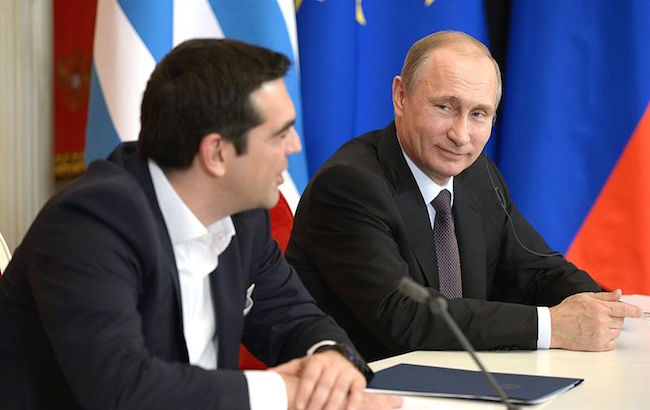
By Prof. Dr. Emanuel L. Paparella
As the Greeks have rejected the EU “fixes” to their country fiscal crisis and Greece’s expulsion from the Eurozone appears imminent, there are political analysts who are now asserting that Putin is ready to reap the benefits of the crisis and that secretly he is already calling the shots. How plausible is such an analysis? Let’s see.
When one considers Putin’s incessant efforts to undermine both the EU and NATO the daring analysis should not come as a big surprise. After all, PM Tsipras called Putin a day ahead of Obama to discuss the crisis’ fallout. One notices an almost reflexive knee-jerk anti-American, anti-Nato and “anti-imperialist” rhetoric in much of the EU, which fits perfectly in Putin’s worldview. We have seen it in Ovi, with an article, with which I took issue, which instead of focusing on this issue of Greece’s links with Russia and the danger of it falling into Moscow’s orbit of influence, focused instead on the analysis of America’s persistent racism as dangerous to democracy and something the Europeans should shy away from, never mind that losing one’s freedom may well be a greater calamity than losing one’s democratic capitalistic system based on free-markets, the banking system and entrepreneurship.
Be that as it may, I don’t think we’d be too far off the mark in declaring that anti-EU and anti-American sentiments run deepest in Greece when compared to the other NATO partners. On the other hand, ties between Athens and Moscow are nothing new. They are based on an historical sharing in the “Greek-Russian Orthodox” tradition which then translates easily in anti-Western values and the appeal to common Orthodox religious roots. Moreover, it is a well known fact that Greece has long been a playground for Kremlin spies. During the Cold War, KGB operatives, Putin’s colleagues, worked in Greece with a degree of impunity they found in no other NATO country, while Soviet spies penetrated Greek politics and society very deeply.
Under Putin, such covert linkages have been reestablished, and secret Russian activities in Greece today enjoy a degree of openness they never had in Soviet times. Defense Minister Panos Kammenos, shortly after a visit to Moscow last fall, signed a memorandum of understanding between his Athens think tank, the Institute for Geopolitical Studies, and a Moscow counterpart, the Russian Institute for Strategic Studies, known as RISI. However, RISI is not your average think tank. It is headed by Leonid Reshetnikov—a career KGB officer who retired as a lieutenant-general and the head of analysis for the Russian Foreign Intelligence Service, or SVR—RISI is a Kremlin outfit, a sort of governmental NGO that functions as the public face of Putin’s vast intelligence apparatus. Officially RISI is no longer part of the SVR, falling under the presidential administration, but no Western intelligence services accept that claim at face value. Reshetnikov, a one-time communist but now a devout, militant, Orthodox Christian, is close to Putin and is one of the top movers and shakers in the Kremlin when it comes to spy matters. Speaking Greek and Serbian, he plays a large role in Russian activities in the Balkans, which have increased noticeably in recent months. Reshetnikov’s trips to southeastern Europe, where he denounces Western “imperialism” and does photo ops with senior Orthodox clergy, feature in local media, usually with praise.
The question arises: how does one square this circle? For, after all, if there is a West, it is due to the ancient Greeks who began making distinctions between Western and Eastern values some three thousand years ago. Western values were and have since been formulated and buttressed by democracy, philosophical thinking, transparency, and free speech, if rarely by solidarity and understanding of each others’ unique ethnic cultures. In any case, Greece remains solidly in the EU and NATO camp, and will presumably remain so in the foreseeable future even if it ends up exiting the Eurozone. So, time will tell if the Russians who are good at strategic political chess games, will be able to pull a check-mate out of Greece’s present dramatic chaos, at the expense of NATO and the EU and indeed the whole of Western civilization. If they win, it will surely be considered a positive development by Putin’s Russia to the chagrin of the EU myopic politicians and bankers intent on examining their banks’ bottom lines. Whether or not it will be a win for democracy in the EU is a rather more dubious proposition.
* This article has originally appeared in Ovi Magazine on July 10, 2015




